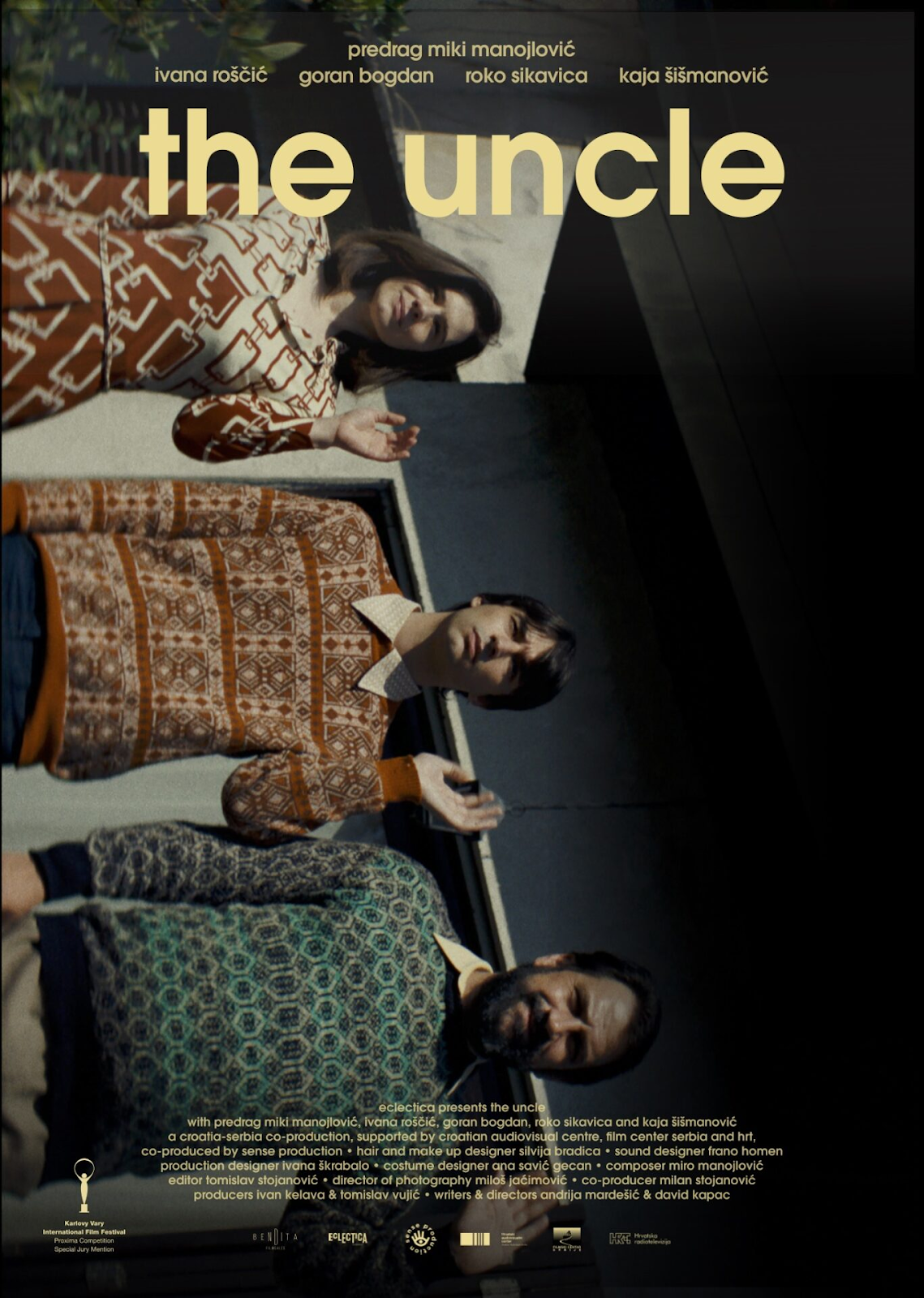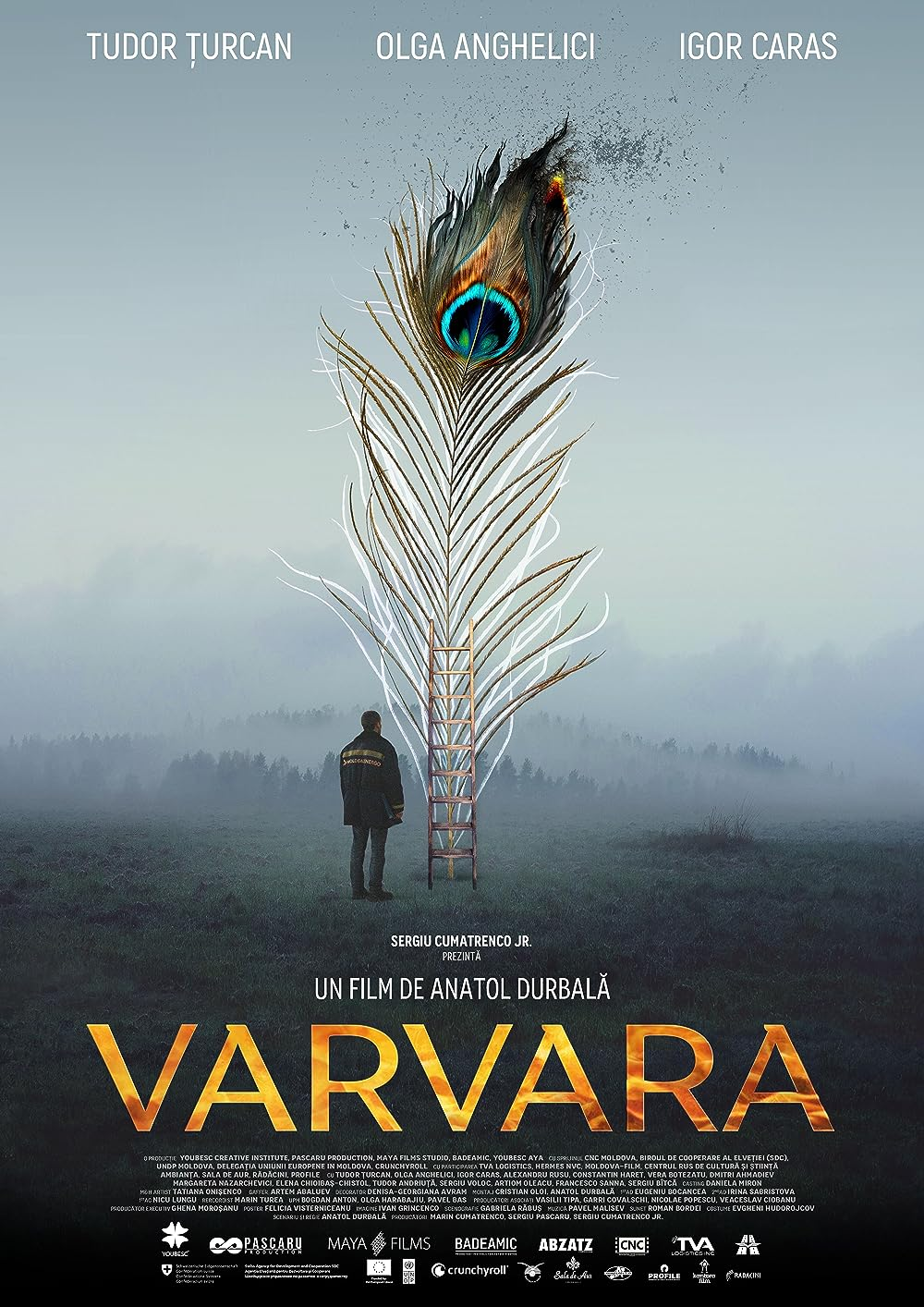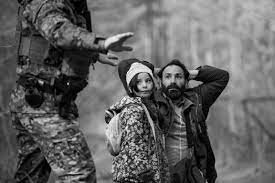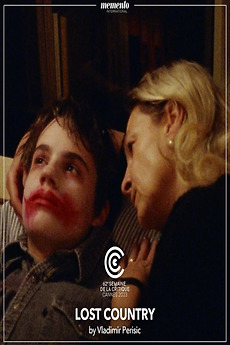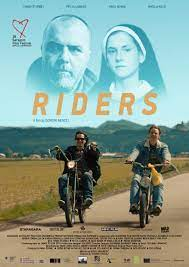1. ALBANIA- “Luna Park” Florenc Papas was selected three years ago for “Open Door”, and he’ll probably represent Albania again with “Luna Park”, co-starring Nik Xhelilaj, one of Albania’s biggest stars, who has returned home after spending most of the last ten years making films in Germany and Turkey. “Luna Park” is about a mother and son caught in an outbreak of Albanian civil unrest during the 1990s.
2. ARMENIA- “Light Drops” Armenia deserved an Oscar nomination (and possible win?) last year for beautiful animated documentary “Aurora’s Sunrise”. This year, I predict they send “Light Drops”, a period drama about how the country suffered during the difficult days after the collapse of the USSR. However, Armenia often sends documentaries…so they could send “5 Dreamers and a Horse”, about the dreams and aspirations of diverse a diverse group of Armenians, or perhaps “Tonratun”, about a family of women discussing current events while making bread together as a family. It was the only Armenian feature at the Golden Apricot Film Festival this year. Another documentary- “Landshaft”- has seen more festival play but is handicapped by a German director, while U.S. co-production “Amerikatsi” was released too early.
3. AZERBAIJAN- “Cold as Marble” Azerbaijan has several options this year, but release dates are confusing and local films often have major difficulties getting into local cinemas dominated by Turkish, Russian and Hollywood fare. I planned to predict “Maryam” because it was directed by Elchin Musaoglu who also made “Nabat”, probably Azerbaijan’s highest-profile Oscar submission to date. The Azerbaijani Academy can be cliquey and Musaoglu is a respected filmmaker who has been picked before. But “Maryam”, about a woman who returns from the U.S. to take care of her ailing father, hasn’t premiered yet. Azerbaijan also has two festival entries- “Sermon to the Fish” (Locarno/Busan) by prolific young arthouse director Hilal Baydarov, and tragicomic “Cold as Marble” (Tallinn Black Nights), about a man whose father returns home unexpectedly from prison. I personally would recommend they send the well-reviewed “Marble” so that’s my prediction for now. There’s also custody drama “Banu”, which could be Azerbaijan’s first submission directed by a woman.
4. BELARUS- “Summer of ‘89” Belarus sent two films to the Oscars in the mid 90s, and then three more from 2018-2020 when the country was slowly opening up to Europe….But that all ended when Belarus rigged elections in 2020 and supported the Russian invasion of Ukraine in 2021. Belarus will presumably join the Russian boycott, but if the local opposition can form a selection committee, we could see Soviet-era coming-of-age drama “Summer of ‘89”, which did get screened in Belarus in late 2022 (though it didn’t get a regular cinematic release) or docu-drama “A Date in Minsk”, which has a young couple playing fictionalized versions of themselves.
5. BOSNIA-HERZEGOVINA- “Excursion” The Sarajevo Film Festival competition lineup was just announced and “Excursion” (which also got a sidebar berth in Locarno) was the only local Bosnian feature on the list…It’s about how a student’s lie during "Truth or Dare" ends up wreaking havoc in her small community (sounds like “The Hunt”?) As of July 25, the local “BH Film” programme hasn’t been posted. Bosnia also has two other options by talented, previously submitted directors. From Pjer Zalica, we have “May Labor Day”, an old-fashioned drama (Cineuropa calls it “anachronistic”) about a man who returns home from abroad to find his father has disappeared; rumor has it he’s been arrested for war crimes. Ahmed Imamovic (who directed my favorite Bosnian film, “Go West”) has “Die Before Death”, a mystery-thriller about an abortion doctor. “Excursion” should get this, with “Die Before Death” in second place.
6. BULGARIA- “Blaga’s Lessons” Poor Bulgaria…”In the Heart of the Machine” richly deserved an Oscar nod last year but somehow missed out. This year should be an easy choice. “Blaga’s Lessons” won the Grand Prize at Karlovy Vary and director Stepan Komandarev got Bulgaria’s only shortlist spot (in 2009). “Blaga” is a senior citizen who gets cheated out of her life savings, who quickly gives up on her morality to become a heartless scammer herself. Bulgaria hasn’t picked Komandarev’s last two movies, so it’s not a sure thing….but “Blaga” looks like one of the most exciting films of the year so I’m confident they’ll pick it if it gets a domestic release by October 31. If not, “The Good Driver” won Best Bulgarian Film at the Sofia International Film Festival, “The Art of Falling” won at the Bulgarian Academy Awards, and “Spring Equinox” won the Jury Prize at the Golden Rose Film Festival (“Mother” won Best Film but that was released last year). The director of last year’s brilliant prison drama “In the Heart of the Machine” also has a new film- “Trust Game”, as does Milko Lazarov (previously selected for “Aga”) who has xenophobia drama “The Herd”. Also, senior director Georgi Djulgerov- who has never been selected- has period drama “Memoir of a Betrayal”. I expect to see all seven of these films on the Bulgarian shortlist, with “Blaga” easily winning the nod, “Art of Falling” coming second, and migrant dramas (a popular subject with the Bulgarian Academy) “Good Driver” and “The Herd” in third and fourth.
7. CROATIA- “The Uncle” The Croatians have a wide-open race. 14 new films competed at the Pula Film Festival this month, which announced its winners on July 23. Documentary “Bigger Than Trauma”, about women sexually assaulted during the wars of the 1990s, won Best Croatian Film, while four other films (“Safe Place”, which went to the Oscars last year, plus drama “Traces” , animated film “Cricket & Antoinette” and comedy “Carbide”) won three awards each. Croatian films often take months (or even a year) to hit local cinemas so not all Pula award winners will be eligible. Croatia often makes unpredictable choices for the Oscars; while I’ve loved their last three choices, most critics seem to disagree with me (and with the Croatian Academy). I’m predicting quirky uncomfortable Haneke-esque thriller “The Uncle”, which won Best Screenplay at Pula last year, and which feels very much like the same vibe as Croatia’s recent picks “Tereza37” and “Extracurricular”….AMPAS probably won’t like it. I have rape documentary (and Pula winner) “Bigger Than Trauma” in second place and “Hotel Pula”, about a forbidden romance between an older Bosnian man and an underaged Croatian teen, in 3rd. Both of these came in Top 5 with Pula audiences (“Trauma” in 2nd and “Hotel” in 5th), but it was children’s animated film “Cricket & Antoinette”, about the ant & the grasshopper fairy tale, that came in #1. Croatia has a strong tradition of animation but it would be an odd choice for the Oscars, so I have “Cricket” fourth and Pula premiere “Good Times, Bad Times”, about a man at an unusual restaurant, in 5th place. Director Nevio Marasovic has been passed over several times and lead actor Radko Polič died shortly after making the movie, so it would be a sentimental choice. Dark horse: 95-year old Veliko Bulajic has the yet-to-be-screened war drama “Escape to the Sea” but the Croatian Academy tends to like young, edgy filmmakers and I expect “Escape” may be more competitive for Montenegro (See MONTENEGRO).
8. CZECH REPUBLIC- “We Have Never Been Modern” The Czechs used to be one of the powerhouses in this category….but this year marks twenty years since their last Oscar nomination. They’ve been mostly quiet this year (or two) but they had three really intriguing options by fresh, young directors at Karlovy Vary. The most likely choice is “We Have Never Been Modern” a mystery-drama about a pregnant woman who finds a dead baby with intersex organs abandoned in her small traditional community. It’s one of only two Czech films in contention for the Crystal Globe, and that’s where the Czech Republic finds its Oscar submissions roughly half the time. But the Czech Academy has an independent streak and I could see them picking either buzzy new sci-fi flick “Restore Point”, a murder mystery about a future in which you can “reboot” a person who has just died, or “She Came at Night”, a bizarre but very well reviewed horror-comedy-drama-thriller about a mother-in-law whose visit threatens to wreck a marriage (it looks like “War of the Roses”). “Restore” already has a U.S. distribution deal and Variety says it’s primed for an English-language remake. Czech Republic has been absent from the major festivals this year so those are the three frontrunners but there are also a couple of potential dark horses: “Two Words as the Key”, about a diverse group of people hiking in the Himalayas will premiere in late July; “A Sensitive Person”, the second Czech film competing in Karlovy Vary, though it seems less accessible; “Great Nothing”, a documentary about the Czech response to COVID-19, and “Tony, Shelly and the Magic Light”, an animated family film- the Czechs are rightfully proud of their animation….Making the Czech race more confusing is the announcement this week that Agnieszka Holland’s migrant drama “The Green Border” is finished and premiering in Venice. Holland is Polish but her last film represented the Czech Republic. I predict “Modern”, followed by “Restore Point”, “She Came at Night”, “Green Border” (unclear if it’s eligible) and “Two Words”
9. ESTONIA- “Smoke Sauna Sisterhood” Estonia has had a fairly weak year, and I predict they’ll send their first ever documentary submission- “Smoke Sauna Sisterhood” (Sundance, Best Documentary Director) about women baring secrets in the country’s famous saunas. Ironically, neighboring Finland sent a similar film (about men in saunas) in 2010. If Estonia wants to send a fiction feature, it will probably be time-travel drama “Stairway to Heaven”. Mystery thriller “Melchior the Apothecary: The Executioner’s Daughter” is the third in a big-budget trilogy by a popular director, but they didn’t send either of the first two films….so I doubt they’ll send this one either. Three upcoming films (“8 Views of Lake Biwa”, “Dark Paradise” and “One-Dimensional Man”) could also seriously contend if they get released by the deadline, especially “One-Dimensional Man”.
10. GEORGIA- “Blackbird Blackbird Blackberry” Georgia has quite a competitive race with the two winners of the National Competition at the Tbilisi Film Festival (1st Place “A Room of My Own” and runner-up “The Drummer”) competing against three films by previously submitted directors (“And the Sun Rises”, “Beautiful Helen” and “Resting Samurai”) plus the Georgian representatives at Berlin/Sarajevo (“Blackbird Blackbird Blackberry”) Karlovy Vary (“Citizen Saint”) and Rotterdam (“Drawing Lots”). On paper, “A Room of My Own” and “Beautiful Helen” look strongest….”A Room of My Own” is the highest-profile of the eight films, won Best Georgian Film in Tbilisi and has gotten very strong reviews for its story of two female roommates during COVID….but queer themes have upset some in the conservative country and I’m not certain it got a domestic release which is once again required. “Beautiful Helen” is by the director of “Corn Island” (which I hated), the last Georgian film to be shortlisted…..but reviews have not been good enough to send it. So, I’m predicting that the Berlinale label and its recent selection for Sarajevo propels “Blackbird”, about a 48-year virgin whose life is the subject of gossip in her provincial village, to the top and will represent Georgia. I have “Citizen Saint” in second, and controversial “A Room of My Own” in third place. Rounding out the Top Five: “Drawing Lots”, a B&W mystery-drama and “Resting Samurai”, a family soap opera.
11. HUNGARY- “Semmelweis” Hungary’s selection committee has made odd choices the past two years, choosing a spooky horror flick and a patriotic movie about taxi drivers over films that had much, much stronger reviews. So far this year, Hungary only has two strong possibilities- dystopian anime “White Plastic Sky” (Berlinale Encounters), set in post-apocalyptic Hungary in the year 2123, and “Six Weeks” (Sarajevo, Tallinn Black Nights), about a young woman struggling with her decision to put her baby up for adoption. But they have three strong upcoming films, including two by the directors of important Oscar submissions. Historical drama “Semmelweis” is a biopic/true story of a 19th century doctor who fought official bureaucracy to help defeat an epidemic that was killing babies in 1847 Vienna. Director Lajos Koltai was hotly tipped for an Oscar nomination for Holocaust drama “Fateless”…but didn’t get it. Barnabas Toth was somehow shortlisted for glorified TV movie “Those That Remained” a few years ago (another Holocaust drama, but far inferior to “Fateless”), and he has a baity new thriller about a train escaping Communist-era Hungary in 1956, called “Master Game”. Last, “Explanation for Everything”, the story of a graduation exam that causes a national scandal told from three different perspectives, was just announced for Venice. Hungary likes to pick last-minute releases, and “Semmelweis” is scheduled for a fall release so that’s my pick. I have “Six Weeks” as runner-up, and “Explanation” in third.
12. KOSOVO- “The Land Within” Kosovo is highly likely to send Swiss co-production “The Land Within”, about a Kosovar who leaves his home to Switzerland to visit a dying relative in his home village where most men were killed during the war. It’s a slow-burn mystery that won Best First Feature at Tallinn Black Nights. Bota Jonë (Venice), directed by 22-year old French-Kosovar actress Luana Bajrami, probably won’t premiere in Kosovo in time.
13. LATVIA- “Soviet Milk” Latvia is confusing because their two best prospects have tentative release dates in November 2023, although this year’s cut-off for the International Feature category is October 31. I’m pretty sure Maris Martinsons’ 19th century patriotic drama “In the Land That Sings” would win this easily….but I believe it will compete next year. Ditto Aigars Grauba’s musical biopic “Jumprava”, though that might be too Latvian to resonate with international audiences. So, that leaves “Soviet Milk”, about a woman doctor who refuses to nurse her child due as a result of depression caused by Soviet rule, and “Maria’s Silence”, a historical drama. “Maria” looks stronger but it’s release date is still TBD so it’s “Soviet Milk” by default. Dark horse: Ukraine documentary “Eastern Front” (Berlinale) was listed as a Latvian production, despite its two Ukrainian co-directors.
14. LITHUANIA- “Mariupolis 2” The favorite from Lithuania is “Slow”, a romance about a dancer and a sign language interpreter that won Best Director (Fiction) at the Sundance Film Festival. But last year I predicted Lithuania would select “Mariupolis 2”, a documentary whose director was killed by Russian bombings while filming in Ukraine. It posthumously won Best Documentary at the Lithuanian Film Awards and Best Lithuanian Film at the Vilnius International Film Festival. Lithuania sends documentaries about one-third of the time (more than any other country) so it’s very possible this could go forward this year. Three films that did well at the national Silver Crane Awards are also strong possibilities, namely “Remember to Blink” (Best Picture, Director), an interesting adoption drama, “Parade” (Best Screenplay, Actress), a comedy-drama about a long-divorced couple thrown together in an effort to get their divorce recognized by the Catholic church, and “The Poet” (Best Actor, Supporting Actor), a Communist-era historical drama. I hate picking the same film two years in a row, but I suspect it’s “Mariupolis 2”, with “Slow” in second place and “Parade” in third.
15. MACEDONIA- “M” It’s a confusing race in Macedonia as most of their contenders haven’t premiered yet. Three Macedonian films were at the Cannes Film market: “The Business of Pleasure”, a thriller about human trafficking, “M”, a dystopian sci-fi drama about a global pandemic (it started production before COVID), and “Things Unsaid”, about a teenager whose visit ends up destabilizes a happy marriage. But Macedonia got an Oscar nod for documentary “Honeyland”, and “The Love Room”, about two women patiently awaiting conjugal visits with their imprisoned husbands, looks very good. And just this week, “Housekeeping for Beginners”, by Australian-Macedonian director Goran Stolevski (“You Won’t Be Alone”), got a Venice Horizons berth. Lastly, there’s horror-drama “Piargy” by Ivo Trajkov, who has represented Macedonia three times. It was made in Slovakia (and shortlisted but not selected by Slovakia last year) but could be eligible for Macedonia this year. I think this will be an extremely tight race between “M”, and “Love Room”, with “Housekeeping for Beginners” not far behind.
16. MOLDOVA- “Varvara” Last year, Moldova returned to the Oscars after an eight-year absence with black comedy “Carbon”. The same production company has a new film- “Varvara”- out in 2023, about an honest (and agnostic) man with a moral dilemma- he is offered generous bribes and kickbacks to do a project that would destroy a priceless religious icon. It’s another dark comedy and one of the films I most want to see from the region this year.
17. MONTENEGRO- “Children” Tiny Montenegro (pop: 600,000) joined the Oscars in 2013. Despite their tiny film industry, they’ve only missed one year since….This year, I predict they’ll send “Children” (aka “Face of Honour”), a really intriguing moral dilemma drama about a boy that seeks refuge with a family, who are then threatened with death and ruin if they don’t turn him in to the mob. But don’t count out “Escape to the Sea”, by Yugoslavian director Veljko Bulajic, about the sole German survivor of a WWII battle, wandering the Yugoslav countryside. Why do I call Bulajic Yugoslavian? Well, Bulajic represented Yugoslavia SEVEN TIMES between 1959 and 1983 (and independent Croatia once), netting an Oscar nod for “The Battle of Neretva” over 50 years ago in 1970. Yes, he’s 95 years old and has links to both Croatia and Montenegro, though the film itself is a majority Croatian production. Neither film has been screened yet and it’s possible Croatia may claim “Escape”.
18. POLAND- “Green Border” Recently, Poland has the best record in Eastern Europe, with four nominations (including one win) in the past ten years; all were decent films but I probably wouldn’t have nominated any of them. But 2023 has been a pretty quiet year for them. First of all, I assume Cannes Grand Prix winner “Zone of Interest” (in German with a UK director) will contend for the United Kingdom. So, I predict Poland will choose either “Filip”, a WWII drama about a Polish Jew who successfully hides his origins while watching friends and family killed or sent to camps, or Agnieszka Holland’s new migrant drama “Green Border”, which was just selected for the Venice Film Festival….but which could easily compete for the Czech Republic instead. I’m going with Oscar nominee Holland but I’m not confident. “Filip” won 2nd Prize at the Polish Film Festival last year (the winner- “Silent Twins”, starring Black Panther vaccine denier Letitia Wright, was 100% in English) and has gotten strong reviews though it would be a fairly “small” choice for Poland. Poland could potentially pick some late-arriving film that I’ve never heard of, perhaps from the Polish Film Festival in September. My picks for the rest of Poland’s Top 6: innovative animated film “The Peasants” set in the early 20th century, “Bread & Salt”, about a small town dealing with violence against migrants, “Scarborn”, an 18th century costume drama about Poles fighting the Russians, and “The Magic Number”, a difficult intellectual drama about a mathematician, directed by 84-year old Krzysztof Zanussi, who has repped Poland four times (and Poland sometimes picks films by “senior” directors). A Poland film watcher assured me this will go to innovative animé “The Peasants”.
19. ROMANIA- “Do Not Expect Much From the End of the World” Romania seemed to have a two-way race between two upcoming dark comedies by acclaimed national directors- “MMXX” by Cristi Puiu, and “Do Not Expect Much From the End of the World” by Radu Jude, which has just been announced to debut in Locarno. Puiu has been picked twice (“Death of Mr. Lazarescu”, “Sieranevada”) and Jude has been picked three times (“Aferim!”, “Bad Luck Banging or Loony Porn”, “I Do Not Care If We Go Down in History as Barbarians”). But “MMXX” just announced a November release date in Romania making it eligible next year….so Jude should get this easily. “Do Not Expect Much” is an absurdist black comedy about a production assistant seeking to hire an actor for a workplace safety video. She ends up hiring a paralyzed man who was actually injured by her own company. But let’s be careful….Last year was also considered a two-way race (“RMN” vs. “Metronome”) and Romania chose an obscure, unheralded drama (“Immaculate”) instead….so we could see a surprise from “Day of the Tiger” (Sarajevo), about a female veterinarian confronting sexism, “Freedom” (Sarajevo/Venice), set during the violent 1989 Romanian Revolution, or “Familiar”, a new drama about uncovering family secrets, directed by Calin Peter Netzer, winner of the 2013 Berlin Film Festival. I’ve heard people mention “To the North” (Venice) and “Men of Deeds” (Best Picture, National Film Awards) but “North” seems to be mostly in English and “Deeds” opened a week before the qualifying date. I’m sticking with “Do Not Expect Much”, but “Freedom” could easily surprise if it wins awards at Venice or Sarajevo.
20. RUSSIA- “Pravednik” First of all, NO, I don’t think Russia will submit a film. Russia boycotted last year in protest of….um….their own government invading a peaceful neighboring country?! There was actually quite a controversy. The President of the Russian Selection Committee, Oscar nominee Pavel Chukhrai, confirmed that Russia would participate in spite of the war, but then the Russian Film Academy overruled him and said Russia would boycott the awards. Chukhrai resigned in protest. On the off chance that Russia chooses to participate, they’re going to have to choose a film that it would be difficult to criticize….So, for the sake of completion, I’m putting down “Pravednik”, a WWII movie about Jewish Soviet forces rescuing hundreds of civilians under Nazi attack. “Nina”, a co-production with Western-oriented Georgia, represented Russia in Shanghai and tells an apolitical story of a happily married woman who goes to visit her ex-lover on his deathbed. Nazi trial drama “Nuremberg”, ethnic Buryat drama “Dukh Baykala”, ethnic Yakut drama “Don’t Bury Me Without Ivan”, and Moscow Film Festival entry “The Edge of the Broken Moon” could also contend in the unlikely event Russia chose to enter.
21. SERBIA- “Lost Country” Serbia used to send a lot of intriguing, jet-black comedies about Serbian daily life, but recently they’ve leaned heavily on historical films about past glories, or films focusing on grievances against Serbs (or both). These aren’t bad films, but American audiences aren’t so interested in learning about Serbia’s role in World War I. So, while I’m hoping they send comedy-drama “The Beheading of John the Baptist”, about family secrets revealed at a dinner party, I worry it may be jingoistic “Oluja” (The Storm) about the ill treatment suffered by Croatian Serbs during the ethnic wars of the 1990s. But my prediction- “Lost Country”- combines a little of both. It got great reviews at Cannes Critics Week for its story of a boy who slowly realizes his beloved mother is a part of Milosevic’s murderous regime and was recently selected for Sarajevo. Serbia has a number of other good options including low-budget indie darling “Where the Road Leads”, Cold War thriller “Guardians of the Formula” (Locarno/Sarajevo), and prisoner redemption drama “Indigo Kristal”. I think that “Mouth Full of Earth” (which won Best Serbian Film at the FEST Film Festival) and “Have You Seen This Woman?” (Venice Critics Week) are too weird to be serious contenders. The wild card is “Heroes of Halyard”, about Serbian forces helping a group of stranded American POWs during World War II; this would be a perfect combination of what Serbia likes (historical dramas showcasing Serbia) while also making it relatable to Hollywood. But the film has not release date and may have too much English anyway so I’m excluding it… But if eligible, it could seriously challenge “Lost Country”. For now, I predict “Lost Country”, with “Guardians of the Formula” in second, “John the Baptist” optimistically in third, followed by “Indigo”, and “Oluja” (sigh).
22. SLOVAKIA- “Plastic Symphony” Slovak film production is back up after COVID, and no less than three previously submitted directors (Martin Sulik, who has been selected seven times, plus Juraj Lehotsky, and Mira Fornay) have new films. Add a sumptuous lesbian costume drama and an acclaimed documentary in Spanish, and the Slovaks have an evenly-matched five-way race. Alphabetically, we have “The Cathedral”, a documentary about a Spanish madman (visionary?) who spends 60 years building a cathedral from scratch, “The Chambermaid” (Tallinn Black Nights), the lesbian costume drama, “The Horse”, a comedy about a man who randomly finds a horse living in his second-floor apartment, “Plastic Symphony”, about a celebrated musician who reappears after five years secluded away from the public scene, and “She-Hero”, about a little girl looking for her lost bird, which won the Youth competition at Berlinale 2023. All of them have a chance. The Slovak Academy loves Sulik and documentaries, while “Chambermaid” has the best production values, “She-Hero” the awards, and “Plastic Symphony” the tone and subject matter to be selected. I’m predicting “Plastic Symphony”, followed by “She-Hero” and “The Cathedral”….but it’s gonna be close.
23. SLOVENIA- “Riders” Low-budget road movie “Riders” premiered at Sarajevo last year and has flown under the radar, getting excellent reviews (Screen Daily called it “quietly excellent”) at various festivals and winning three awards at the Slovenian Film Awards late last year (it lost Best Picture to “Orchestra”, Slovenia’s Oscar submission last year). Its main competition comes from two co-productions that I believe are both eligible- “Moja Vesna” (Berlin 2022), a Slovenian immigrant family drama set in Australia, and “The Man Without Guilt”, set in the Italian-speaking Slovenia/Italy border area. Rounding out the Top Five options for Slovenia: “Wake Me”, the redemption tale of a far-right nationalist, and “Lunatic”, following 40 years in the life of a sailing family.
24. UKRAINE- “Pamfir” Слава Україні! Slava Ukraïni! Ukraine’s film industry has defiantly continued to crank out an amazing quantity of fiction features and documentaries despite the Russian invasion. Cinemas somehow remain open. Critically acclaimed “Pamfir”, about a family man who resorts to crime to support his family, was considered a strong contender last year but it didn’t premiere in Ukrainian cinemas until 2023. It’s my pick for Ukraine but it’s by no means a sure thing as it faces stiff competition from “Luxembourg, Luxembourg” a road comedy about two Ukrainian twins who learn the father that abandoned them is dying in Luxembourg. Both films are nominated in the Big Three categories (Picture, Director and Screenplay) at the upcoming Ukrainian Oscars (against “Klondike”) which will be given out in August 2023. “Butterfly Vision”, about a POW victim of sexual assault, got nominated in Picture and Screenplay but not Director, showing that it is well-liked but slightly behind the other two films. But the war has meant that some of the best films made in Ukraine are documentaries like “20 Days in Mariupol” (Sundance Audience Award; journalists reporting from the bombed city of Mariupol), “Iron Butterflies” (Sundance; the shooting down of MH17) and “We Will Not Fade Away” (Berlin; small town teenagers living through the current war). Unknown quantity: “Stepne”, the feature debut of a Cannes Palme d’Or Short Film winner, has just been announced for Locarno and “La Palisiada” has just been announced for Sarajevo. I predict “Pamfir”, followed by “Luxembourg” and “20 Days”. Best of luck Ukraine!






